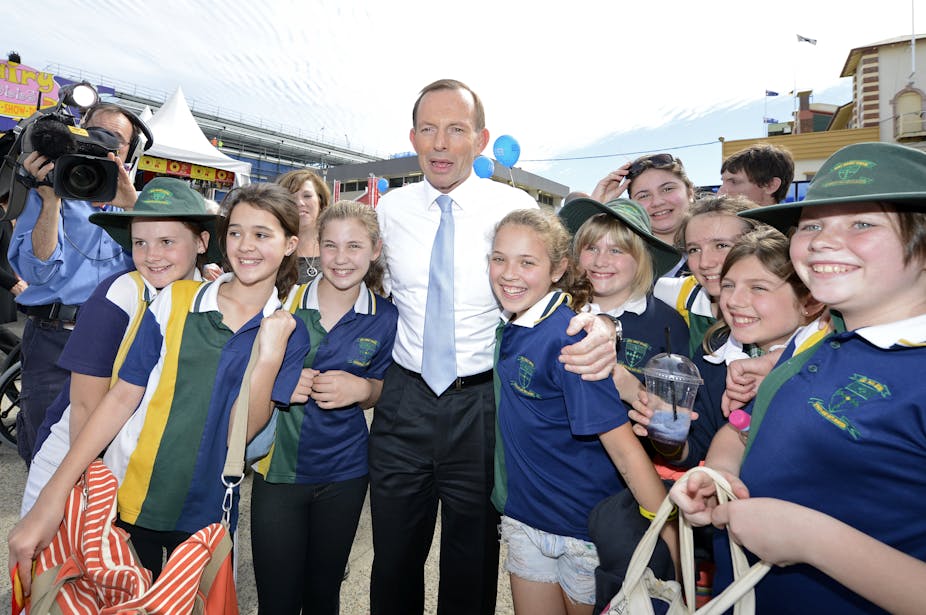From the beginning of the 2013 election campaign, prime minister Kevin Rudd has put young people front and centre. Be it through the use of social media (although no more “selfies” have surfaced of late) or the recent appointment of Barack Obama’s digital team as well as his own 20 year old son, Marcus, Rudd has signalled that the youth vote is important.
And with good reason. Making up about 30% of the electorate, but not oriented in any persistent ideological direction, young people remain untapped as a political resource.
Many also remain unenrolled. The same proportion (30%) of the 1.4 million eligible Australians missing from the national electoral roll are young people, with only around 35% of potential voters between the ages of 18 to 24 registered to vote in the coming federal election. This leaves 493,113 young people unenrolled as of March 31 this year.
A well-trodden trope maintains that young people are democratically apathetic, lack civic and political knowledge, and make a lesser contribution to society than older folk. More recently, phrases like “self-entitled” have been added to the mix. Young people are increasingly accused of having “tickets on themselves”.
These tropes and accusations miss the mark because they conflate all young people as a single group. They also reinforce mistrustful views of young people. As sociologist Nikolas Rose says, they depict young people as failed citizens, even as “anti-citizens”.
Yet beneath these tropes lies an important truth. As education professor Murray Print recently explained on ABC’s The World Today program, many young people do feel disengaged from politics. Perhaps this goes part of the way to explaining the recent Lowy Institute poll, which suggested that only 48% of 18 to 29 year olds prefer democracy to any other kind of government.
The big issues
This doesn’t necessarily mean that young people are apathetic: they may just be unconvinced that the political machinery is the best way to pursue the issues they care most about. These are not just “youth” issues, but matters that are at the heart of the coming election. The 2012 Mission Australia Youth Survey of over 15,000 young people shows that the top two issues that concern young people are the economy and financial matters and population issues.
So why aren’t young people’s concerns about these sophisticated political issues translating into electoral enrolment and political engagement? Perhaps some young people are unimpressed by the recent antics of politicians of all stripes, but there is something deeper going on. Consistently, our public institutions - including schools - are not doing well in encouraging young people to feel that they have a stake in those institutions, that they can influence those institutions, or that they can influence society through them.
This is despite a growing emphasis on citizenship education in Australian schools, especially in forms that encourage what has been called “practical citizenship”. This is the idea that young people should not only participate in civic and political life, but should improve and influence that life for the better. It isn’t a new idea, nor is it absent from Australia’s current educational goals: the new Australian Curriculum makes it clear that this is the central responsibility of schools.
Building democracy
The most recent review of civics and citizenship education by what is now the Standing Council on School Education and Early Childhood shows that schools which give students the chance to practically participate in meaningful ways – in their classroom, their school, their community or in an even wider sphere – perform better within the citizenship curriculum. It also shows that individual students who have the opportunity to participate perform better than those who don’t.
This isn’t particularly surprising, but the evidence is that only a minority of Australian schools are providing such opportunities. The fallout from this is that Australian students’ confidence in their ability to participate actively in their schools and elsewhere falls below the international mean.

Various studies, including the extensive international IEA Civic Education Study, indicate that young people in Australia do not feel free to disagree with their teachers about social or political issues, to generate their own views of such issues or to state these views within the classroom. Australian students are also less likely than their international peers to value active or practical forms of citizenship, such as actions that promote human rights, protect the environment or protest against unjust laws.
Haunted by ghosts
Despite the investment of successive Australian governments in civics and citizenship education, there are no specific policy mechanisms to encourage schools to enable young people’s participation or to measure their efficacy in doing so. Education policy may even be working against educators who want to promote their students’ active participation through the curriculum.
A recent study by the Whitlam Institute suggests that the escalation of measurement and testing regimes such as NAPLAN may be closing down the space within the school curriculum for more participatory or democratic forms of education. Other studies, including a 2010 national survey of Australian school leaders, shows that many school leaders feel to be captive to the constraining demands of education policy. It also revealed tensions between their beliefs in the democratic purposes of schooling and what they perceived as anti-democratic policy agendas.
At a time when governments and quasi-government agencies are increasingly worried about young people’s political engagement, the risk is that educators’ efforts to encourage this engagement are joining what education professor Jane Kenway has described as the “ghosts” that haunt the Australian curriculum: the education values and practices that have been discredited or superseded by more pressing policy agendas.
If this is the case, we may all be haunted by young people’s absence from the policy process. Their absence from the ballot box is only the beginning.

